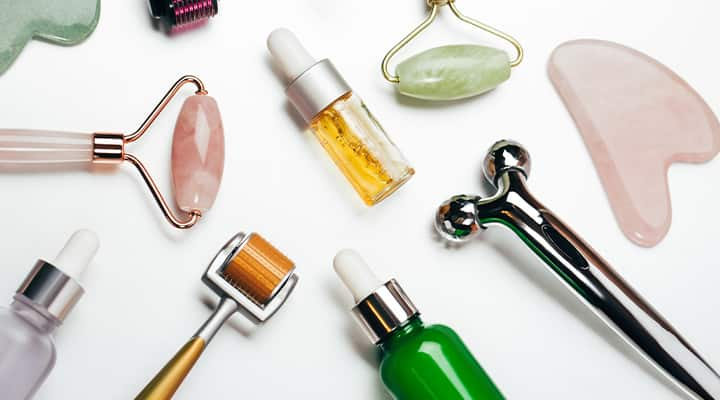
15 Foods for Skin Health
Published: February 2025
We all dream of radiant, glowing skin, which is why topical skin care products like serums, exfoliants and creams are such a big business. While a skin care routine does matter, skin health goes beyond what you apply to your skin. Factors like your environment, lifestyle choices, and of course, your genetics, all play a role.
So, too, does your diet. No single food can give you flawless skin, but a balanced diet rich in fruits, vegetables, whole grains, healthy fats, and fatty fish can nourish your skin from the inside out.
Here are the top dietitian-recommended foods to help you achieve that glow-up.
Top antioxidant-rich foods for glowing skin
1. Berries
From blueberries to raspberries to strawberries, these tiny fruits pack a powerful punch. Berries are among the most antioxidant-rich foods, loaded with polyphenols that provide antioxidant and healthy inflammatory response benefits. These compounds help combat oxidative stress, which can slow down premature skin aging. So, go ahead and toss some berries onto your snack plate, oatmeal bowl, or smoothie for a skin boost.
2. Citrus fruits
Sweet, juicy citrus fruits like oranges, grapefruits (and also kiwis) are bursting with vitamin C, a powerhouse antioxidant that helps protect against free radicals, which can speed up aging. Vitamin C not only supports your immune system, but also plays a key role in collagen production, keeping your skin smooth, firm and radiant.
3. Pomegranates
Beneath the tough outer shell of a pomegranate lie sweet, juicy seeds (called arils) brimming with skin-friendly nutrients. Both pomegranates and their juice are rich in antioxidants and inflammation health support compounds like anthocyanins, ellagitannins, and ellagic acids, which can help maintain healthy skin. So, be sure to add the arils or juice into your weekly routine!
4. Cruciferous vegetables
Kale, broccoli, and cauliflower are cruciferous veggies loaded with vitamins C, A, and E, plus antioxidants like sulforaphane, lutein, and lycopene. Together, these nutrients help protect your skin from UV rays, fight premature aging, and may even reduce skin thinning. Get creative with your cruciferous veggies, and try them roasted, sautéed, grilled or air-fried for a skin boost.
5. Tomatoes
Toss them into a salad, layer them on toast, bake them in your shakshuka, or enjoy them in a classic Caprese; indeed, tomatoes are a versatile veggie! Their vibrant color comes from lycopene, a powerful antioxidant that helps protect your skin. For maximum absorption, pair your tomatoes with a healthy fat, like a drizzle of olive oil or an avocado.
6. Dark leafy greens
Popeye may have credited spinach for building strong muscles, but dark leafy greens are also amazing for your skin. Greens such as kale and collards (which are both leafy and cruciferous) are loaded with vitamins A, C and E, and plant compounds like polyphenols. Dark leafy greens nourish and protect skin from external stressors such as UV rays. Keep your skin glowing by blending a handful into a smoothie, stuffing them into a sandwich, or tossing them into a fresh salad.
7. Carrots
Crunchy, sweet, and perfect for dipping, carrots are a true skin superfood. These vibrant orange veggies are packed with beta carotene (also found in other orange veggies like sweet potatoes), which converts to vitamin A in your body. This nutrient promotes cell turnover, protects against UV exposure, and helps keep wrinkles away. Research even suggests that eating carrots can enhance your skin tone, giving your face an attractive glow. Add carrots into your next slaw, toss them into a salad, or roast them for a delicious side.
8. Bell peppers
Did you know that bell peppers are 92% water? That means every crunchy bite helps keep your skin hydrated and plump, which is essential for a healthy glow! On top of that, bell peppers are brimming with vitamin C and A, which support collagen production and promote a healthy complexion. Eat them dipped in guac, sautéed with onions for taco night, or stuff them into sandwiches for a satisfying crunch.
9. Almonds
One serving of almonds is about 23 almonds (this is easy to remember: 1-2-3). This mere handful delivers a large dose of vitamin E and unsaturated fats that support your skin's glow. Vitamin E is a powerful antioxidant that helps protect your cells, keeping your skin youthful, glowy and healthy. Snack on them by the handful, sprinkle them over your morning cereal, or use them as a crunchy crouton substitute.
10. Tea
One of the world's most popular beverages houses a surprising amount of antioxidants, which is good news for your skin! Green tea leads the pack with the highest antioxidant levels per cup, thanks to a polyphenol called epigallocatechin-3-gallate (EGCG). Along with the antioxidants found in white, black and oolong teas, green tea helps support a healthy inflammatory response, protects against UV rays, and minimizes wrinkles. Sip tea hot, cold or pour into a mocktail or smoothie!
11. Coffee
For many, coffee is a must-have to get out of bed. It doesn't just perk up a tired body but wakes up your skin, too. Coffee beans are packed with polyphenols that help support a healthy inflammatory response and fight oxidative stress. They may even boost skin elasticity and help keep your skin looking youthful. So, continue to brew yourself a cup (or two) and sip your way to better skin! Pro tip: add collagen to your coffee for twofold benefits.
Explore Our Best Skin Care Products
12. Fatty fish
Fatty fish like salmon, sardines, and herring, are swimming with skin-supporting nutrients because they are an excellent source of omega-3 fatty acids, vitamin D, zinc, glutamine, and more. Omega-3s, in particular, help support a healthy inflammatory response, lock in moisture and help keep your skin hydrated. And don't toss the salmon skin: it's rich in collagen, so it's important to eat. Reel in more fatty fish into your weekly diet for glowing skin!
13. Dark chocolate
Good news for chocolate lovers, dark chocolate with 70% cacao or higher comes with skin perks! It's rich in antioxidants, theobromine, and micronutrients like copper, iron, and magnesium, which support collagen production and a healthy inflammatory response. Enjoy a square or two for a skin-boosting snack!
14. Avocado
Avocados are packed with monounsaturated fats that help create a moisture barrier, keeping your skin hydrated and soft. Research shows that eating an avocado daily can increase skin elasticity and firmness. So go ahead, and continue munching on your avocado toast for brunch.
15. Eggs
This kitchen staple is a protein-rich food that offers skin benefits. The yolk contains choline, a vitamin-like nutrient that supports collagen production, helping keep your skin firm and smooth. Plus, it's loaded with lutein, a carotenoid that protects skin cells from UV exposure. So don't toss the yolk! Add a whole egg into your next breakfast bowl, wrap, or shakshuka for a skin-friendly meal.
FAQs
Q. What types of seeds support healthy skin?
Seeds like flax, chia and hemp seeds are easy to sprinkle into your diet for healthy, glowing skin. They're rich in healthy unsaturated fats, including omega-3s, which work to support a healthy inflammatory response and support hydrated skin. Plus, these seeds are also rich in vitamin E, an antioxidant to help protect your skin.
Q. What are the best fats for skin health?
The right types of fats are essential for keeping your skin healthy. Unsaturated fats, including monounsaturated and polyunsaturated fats, are the best kind of fats for skin and can be found in many foods.
- Monounsaturated fats: olive oil, avocado oil, avocados, olives
- Polyunsaturated fats: fatty fish (like salmon, herring, sardines), seeds (like chia, flax, hemp) and nuts like walnuts
These healthy fats penetrate deep into the layers of your skin, enhancing its appearance, maintaining a radiant glow and supporting its regeneration. Make sure to include these foods in your diet to nourish and support healthy, glowing skin.
Q. How does hydration influence your skin?
Water makes up about 70% of your body, and since most of your cells rely on it, staying hydrated is essential for overall health. When you're not drinking enough water, your skin may appear or feel dry. Research shows that increasing water intake can improve blood flow to the skin, enhance its appearance, maintain skin elasticity, strengthen the skin's barrier, and slow down the signs of aging.
In addition to drinking water, you can stay hydrated by eating foods rich in water, such as watermelon, cucumbers, or bell peppers, as part of a balanced diet. And remember, it's important to visit your dermatologist regularly for skin checks to maintain healthy skin.
Q. Which are the best nutrients for skin health?
Several nutrients play a critical role in maintaining healthy skin. These nutrients for skin health include vitamin A, vitamin C, vitamin D, vitamin E, zinc, omega-3 fatty acids, polyphenols, and minerals like copper and selenium. In addition, collagen, a protein, is also vital for skin health, as it serves as the primary building block for the skin. Collagen can be found in foods like salmon; it can also be taken as a supplement. Research shows that collagen supplementation can improve skin elasticity and hydration, and reduce wrinkles and roughness.
For added skin support, try Life Extension's Collagen Peptides for Skin & Joints supplement. This unflavored powder easily mixes into foods like chia pudding, yogurt, smoothies, or drinks like juice or water. It's highly digestible and provides three types of collagen to support your body, especially as collagen production declines with age.
A diet rich in these nutrients can support both your body and skin's health. Ready to take your skin care to the next level? Find out what may be missing from your skin regimen.
References
- Al-Atif H. "Collagen Supplements for Aging and Wrinkles: A Paradigm Shift in the Field of Dermatology and Cosmetics.” Dermatology Practical & Conceptual. January 2022. https://dpcj.org/index.php/dpc/article/view/dermatol-pract-concept-articleid-dp1201a18
- Fam WV, et al. "Plant-Based Foods for Skin Health: A Narrative Review.” Journal of the Academy of Nutrition and Dietetics. March 2022. https://www.sciencedirect.com/science/article/pii/S2212267221014337
- Foo YZ, et al. "The carotenoid beta-carotene enhances facial color, attractiveness and perceived health, but not actual health, in humans.” Behavioral Ecology. March-April 2017. https://academic.oup.com/beheco/article-abstract/28/2/570/2990210?redirectedFrom=fulltext
- Henning SM, et al. “Avocado Consumption Increased Skin Elasticity and Firmness in Women - A Pilot Study.” J Cosmet Dermatol. September 2022. https://pmc.ncbi.nlm.nih.gov/articles/PMC9786235/
Always be in the know!
Access the latest deals, wellness news, expert health tips & more!














